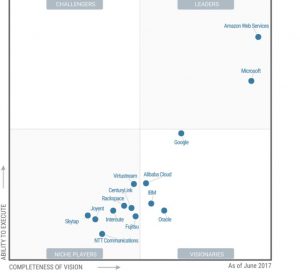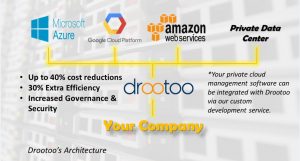From the 1940s the world had been transformed by the different generations of computer technology . There had been massive paradigm shifts in the fifth generation on how computing is performed. From large centralized mainframes to the PC -internet era ushering in democratization of computing power to the current mobile and cloud era.
Distributed computing had been used for some time and web hosting had been a popular technology to serve information on internet through web applications on browsers . There had been evolution in the forms of peer to peer ,network ,client-server and grid computing . However in mid 2000 cloud computing took shape in form of NASA’s Open Nebula and Amazon AWS .Cloud computing had been divided into 3 parts public , private and hybrid computing. Public cloud is where services are rendered over a network that is open for public to use. It gives the option to consume compute ,storage , platform ,networking and other resources to be consumed from a remote location .
Since 2006 when the term CLOUD was officially used with the introduction of Elastic Compute Cloud by amazon , there had been a paradigm shift towards the the way IT is consumed. This helped businesses to move from a traditional IT CAPEX model to OPEX subscription model. However public cloud did not get picked up in the same manner as it was expected by 2010’s . The main concerns for businesses were security , compliance , governance ,knowledge competency and vendor lockin issues.
To mitigate the risks related to public cloud there was evolution of the strategy of private and hybrid clouds . This again required businesses to rely on building and maintaining of on premise datacenter to host private cloud or backup environments. The mix of public ,private and hybrid cloud strategy increased the cost of IT as a mix of capex and opex was always going to be on the higher end and tough to control.
However in 2015 the public cloud technology has evolved to be more robust with public cloud providers securing their systems and addressing challenges of public cloud consumption. The market had seen more strong players entering the scene like Microsoft , GOOGLE , IBM , Rackspace , Red Hat and Oracle . This gives rise to the next level of paradigm shift in cloud computing to have businesses adopt a true public cloud strategy . This is Multi Cloud Computing .
Multi Cloud Computing helps businesses to have complete 100 % datacenter hardware free IT operations. You can use the public cloud where you can run your production with one cloud vendor and your test/dev environment with another. You can use public cloud itself as your high availability and disaster recovery strategy rather than having an on premise setup . Even distributed environment can be used for the purpose of expanding businesses in geographies where one cloud provider is not present . Even super computing power can be leveraged through a multi cloud model to gain high performance and optimized cost for projects like genome sequencing , simulating big bang theory , understanding earthquakes,mapping the blood stream , predicting climate changes or even testing weapon systems.
At DROOTOO we are providing a seamless unified cloud platform to businesses to have a smart and secure way of performing multi cloud computing. This is the true democratization of cloud computing era !

